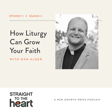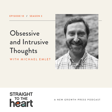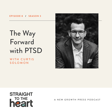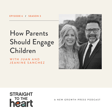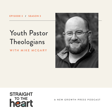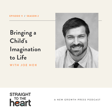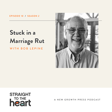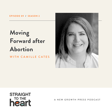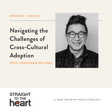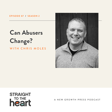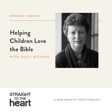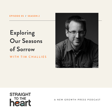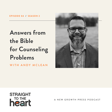Become a Creator today!Start creating today - Share your story with the world!
Start for free
00:00:00
00:00:01

Truth, Beauty, and Goodness with Daniel DeWitt
Daniel DeWitt and Rush Witt discuss the impact of C.S. Lewis on generations of Christians, the unique opportunities for discipleship on college campuses, and the importance of clear and biblical truth. Listeners will be helped and encouraged by Daniel’s down-to-earth way of helping students make sense of the world in creative ways.
DANIEL DEWITT ONLINE
Daniel’s Website
Facebook
Twitter
Instagram
MENTIONED IN THIS EPISODE
Sketchy Views: A Beginner’s Guide to Making Sense of God
Pressure Points: Guide to Navigating Student Stress
Doubtless: Because Faith in Hard
Learn more about the podcast here.
Transcript
Introduction to 'Straight to the Heart'
00:00:00
Speaker
But I wanted to write it to hopefully be accessible for the person I would know best, even though the hardest deceptive of all things would be myself. So I tried to think through like at 17, I've been a Christian for two years, was wrestling with what do I want to do? Is it art or is it, you know, go to Bible college, which obviously I did.
Exploring Christian Beliefs and Influences
00:00:19
Speaker
I want to write to that kid.
00:00:23
Speaker
I'm Rush Witt and you're listening to Straight to the Heart, a podcast from New Growth Press. Each episode includes thought provoking conversations with leading Christian writers and thinkers. We hear who they are, what they believe, how they approach their work in ministry, and the moments in people who have changed their lives. In Straight to the Heart, we go beyond the books to connect with the remarkable people behind them.
Introducing Daniel DeWitt
00:00:48
Speaker
In this episode, I talk with Daniel DeWitt, author of Sketchy Views, A Beginner's Guide to Making Sense of God. Dan's also a senior fellow at Southwest Baptist University, where he leads the Center for Worldview and Culture. He teaches on theology, philosophy, and CS Lewis. He also hosts a Lewis-inspired podcast called Mere Caffeination. You'll enjoy hearing the down-to-earth way Dan helps students make sense of the world in creative ways.
00:01:17
Speaker
Dan's heart runs deep with love for truth and beauty.
Daniel's Podcasting Journey
00:01:22
Speaker
And knowing more of God, this is straight to the heart. I subscribed to your podcast today. I didn't realize that you had a podcast until you said that in your message to me. And that's really interesting. How did you start your podcast? Why did you want to start a podcast?
00:01:42
Speaker
Yeah. So I, um, I would say if you're going to start listening to it, like start with the last episode because I've been learning audio production. So I understand that. Um, I'm going to go back and kind of re whatever you do, re engineer the earlier ones to kind of fix some audio issues. But, um, in my remote position at Southwest Baptist university, you know, um,
00:02:08
Speaker
you have to find creative ways to contribute. And I felt like the, if I did some things that kind of like your podcast with new growth that are helpful to the brand, um, that I could do remotely. So the goal really was I've done it for E for one year. We did the first season and it was just to find a way. Um, I've had people like encouraged me, like, Hey, you should consider a podcast.
The Influence of the Inklings
00:02:31
Speaker
And, um, you know how it is with, with, with doing stuff to build a platform, it always feels a little,
00:02:37
Speaker
Like even if you really want to do just for fun, it feels a little slimy. Yeah. But I think the fact that it would be a way I could promote the school was like the final push.
00:02:48
Speaker
So the podcast is Mere Caffeination, of course, inspired by C.S. Lewis, and the subtitle is an Inklings-inspired podcast about cultivating a winsome Christian witness with clarity, creativity, and kindness. And so it's a kind of a mixture of half interview and then half. This first season, I did a survey through the Screwtape Letters, and then next season, it'll be a survey through Mere Christianity.
00:03:15
Speaker
That's really interesting. Yeah, I'm really interested to listen to it. You know, I would imagine most people, and even myself, I'm familiar with C.S. Lewis and I'm familiar with the term Inklings. And I think I know generally what that was. But you would know a lot more. What exactly were the Inklings? It was a group, right? A group that C.S. Lewis belonged to. But I don't know a lot about who else was a part of it.
00:03:40
Speaker
Yes, so the Inklings was originally a, I want to say it was a title that was used by a student group at Oxford University. And then at some point it was just kind of abandoned, you know, how group names come and go. And so Tolkien and Lewis would meet regularly, J.R. Tolkien, and discuss their writings.
00:03:58
Speaker
And they had been a part of a group earlier that was called the cave, which is really interesting. Yeah. So the Inklings was not their first kind of go around. And that's what I call my office there in this basement. I call it the cave. I don't know. It's probably nothing. There's, it was probably way,
00:04:16
Speaker
better. Wood. Nice wood. I'm imagining rustic. So the cave was like this group of academics who were lobbying to get a new syllabus passed and they spent like a decade
00:04:31
Speaker
And then like it was this grand celebration when they had this syllabus passed, which is to me illustrates how slow changes in higher education.
Creativity and Ministry: Daniel's Story
00:04:41
Speaker
But the Inklings, there's like a technical Inklings, which are the people who actually came to the meetings. Some people came in and out. I think Dorothy Sayers was there on a couple of occasions.
00:04:54
Speaker
brother, Warren Lewis, who he called Morney, was there pretty regularly. And then it's kind of used in a more general sense of people who never attended, never even met Lewis or talking to people like G.K. Chesterton, just because he'll be considered an inkling just because of his influence. So you kind of have those two uses of that term.
00:05:14
Speaker
But they would meet and talk about literature and enjoy one another's company and laughter. And you read about those meetings. They would read each other excerpts of, you know, Lewis read excerpts of the screw tape letters, Tolkien read excerpts of the rings. And you know, just imagine being on the wall. Yeah.
00:05:33
Speaker
Well, this is really great for me because this is the first time that we've really gotten to talk. We've sort of passed before. And of course, with your books, sketchy views at New Growth Press, you know, getting a little familiar with you that way. And one of the things that I think is interesting about you is that not only are you working in higher education, but also there is this real creative thread that runs through, I mean, I mean,
00:06:01
Speaker
a mere caffeination podcast. That's a creative thing. Sketchy Views is a book in which you've sketched out a lot of different aspects to help the content of the book land and make sense and help readers make sense of the world. That's a super creative thing. And so I think that's really interesting that those two things come together. I don't think of that as kind of a normal combo. I'm trying to think about other people I know in higher education. How many do I feel are creatives?
00:06:31
Speaker
I mean, it's always a creative process because there's writing involved in books and all of that. But in terms of creativity, so, you know, it seems like a unique blend. Yeah, I've always been in my, my kids are this way. They're always writing stories and illustrating them. And so I've always loved that and never like aspired to be a writer or even an academic.
00:06:53
Speaker
but I've had some mentors in my life who've just kind of pushed me along the way. And so I ended up getting a degree, but I started out, um, planning on going into graphic design. And so, yeah, my daughter, my daughter, one of my daughters is, is trying to think through that maybe as a career path, you know, it's the creative realm is, is such a neat space. And it's also a real missions opportunity. So I have friends who are in full-time marketing, um,
00:07:21
Speaker
And one of my friends that tells me regularly, we just need more committed Christians who are really good at the trade to be in this space. And so, became a Christian at 15, at 17 felt called to ministry. But right before that, my small hometown, the Women's Auxiliary Unit, or whatever, the group,
00:07:46
Speaker
contacted my art teacher and said, we want to scholarship someone to go to Eastern Illinois University for a summer camp, which I wouldn't have had the money to do it and wouldn't have even thought to do it. And my art teacher called and said, we have this scholarship. It's a summer program.
00:08:01
Speaker
And we want you to be the recipient of it and so i was elated went to eastern illinois university study graphic design for just a couple weeks under the guy who created the big ten logo that not the most current iteration but the last one. And i'm and just left it and thought this is what i wanna do with my life.
00:08:21
Speaker
And then a week later, I was with my very independent, fundamental Baptist church at youth camp. And since God working in my heart, and then from that point was kind of directed, well, you need to go to Bible college. And in my mind, Rush, I really thought that meant like.
00:08:37
Speaker
I'm done with creative stuff, and I just study the Bible. And it took years for me to one, not be embarrassed that I like to draw and sketch, and two, to see that that's actually God's glory is in that. And so what has unfolded over the years has been like wherever I've served, I just end up helping with creative stuff. And I love that for me, like graphic, the Adobe Creative Suite is my happiness.
00:09:01
Speaker
base. That's like a video game for me. That's so interesting. G.K. Chesterton, who's one of my favorite authors, wrote the book, The Everlasting Man, that Lewis called the greatest Christian apologetic he had ever read. He read it as an atheist, so it contributed to his conversion. Chesterton illustrated as many books as he wrote. And so it was Chesterton who kind of gave me a license to put down the textbook and pick up a sketchbook.
The Impact of C.S. Lewis
00:09:33
Speaker
Is your understanding of who God is and how he works in our lives today a little sketchy? Daniel DeWitt's sketchy views is a beginner's guide to making sense of God. In order to understand God, we have to go back to the Bible, but that can be overwhelming if you're new to theology.
00:09:52
Speaker
Well, Sketchy Views uses words and sketches to help readers visually connect with and understand what basic Christian theology is and what it's not. This book contains illustrations to clarify the basics of theology, Christian thinking and making sense of worldview issues.
00:10:11
Speaker
Skeptics, atheists, and theological novices will learn basic truths about God and how Christians through the ages have come to these conclusions. And readers will be challenged to examine their basic beliefs about God and themselves and see how they affect every part of life. Visit NewGrowthPress.com to learn more about sketchy views. A Beginner's Guide to Making Sense of God by Daniel DeWitt.
00:10:46
Speaker
Well, it makes sense why you have been influenced so much by C.S. Lewis. And I really want to hear more about what your connection now in terms of your current work and what you've been doing, you know, how that's connected to C.S. Lewis. But that makes a lot of sense. I mean, there's another great example of, you know, higher education mixed with this really
00:11:07
Speaker
incredible and the inklings that we were talking about, incredible creativity. And how did you get your introduction to C.S. Lewis in the beginning and what was that like? Because I mean, you just said, you know, your introduction to Chesterton really fueled this delight that you had artistically and finding an outlet for that
00:11:32
Speaker
in ministry and really pairing those together. So what was your intro to CS Lewis like? Yeah, so I think when I was in seminary, I would say that Lewis was my favorite author in the same way that I think most seminary students would say they love good coffee. Like it was just kind of expected of you, you know, like there's this hipster ethos and that's just part of it, you know? And so my real introduction was when my wife and I, I was in my doctoral program
00:12:01
Speaker
and our local bookstore nearby in Louisville, Kentucky had a readers group on the screw tape letters. And I thought, I'm going to do that. That'd be a great way to, it wasn't a Christian bookstore. You know, it was actually a borders bookstore that they're closed.
00:12:16
Speaker
You know, it's a chain that's closed now. And so I signed up for it. I reread the screw tape letters, but I didn't have like just a copy of the book. So I went in borders and bought what was the like the signature series and I had several books by Lewis all in one big.
00:12:32
Speaker
You know, one big book and a Reddit kind of developed this theory, like, you know, one have some like really profound insights. And so prepped for it showed up the night of the book club. Nobody else showed up. There was no like.
00:12:47
Speaker
I'd seen a poster for it and I didn't know anybody who was going and then I showed up on the day at the time and nobody was there. So I sat there and I just started flipping through this signature series I brought up and marked up the screw tape letters and I'm like man there's this he wrote this book called a grief observe that was like just him.
00:13:06
Speaker
lamenting the loss of his wife and you know he wrote thoughts on the Psalms like I did you know I just started reading it and then then I really got into it and so then I picked up a book that had some of his letters in it and then now there's a three volume set of Lewis's letters
00:13:21
Speaker
And that's not even all of his letters. I mean, there are the Latin letters of C.S. Lewis where an Italian priest wrote him but didn't know English and Lewis didn't know conversation Italian. So they wrote letters in Latin to each other. So I just started like gobbling up all this stuff and I don't read Latin for full disclosure. So there's English translations in the book.
00:13:43
Speaker
But as I was reading one of the letters, I saw that Carl F.H. Henry had written C.S. Lewis and asked him to write letters, articles for the inaugural edition of Christianity Today, the very first one. And Lewis wrote him back and said, no, he declined the offer. And I was just blown away by that. And so I put it on Twitter and the managing editor of Christianity Today at that time, who I wasn't like buddies with, or he just
00:14:11
Speaker
Because I put Christianity Today in the tweet, he messaged me. And he's like, hey, where did you find that? I didn't know that. And so I shared with him and I'm like, I started looking into it. I'm like, this is really cool. It ties into something that happened really early in Lewis's life.
00:14:29
Speaker
So, he asked me to write an article for Christianity Today on that little tidbit. So, I write that, and then like a month later, and you know things happen, I just kind of got a lot of traction and, you know, I wouldn't say I'm on fire roll, but I got a lot of people reading it. And so, like a month later, I get an email from someone from Desiring God, and they're like, hey, our next conference is on C.S. Lewis, will you be one of our breakout speakers?
00:14:52
Speaker
I'm like, sure. So I go and do that. And then from that point on, I'm getting introduced as a Lewis scholar. And I'm like, all I did was sign up for a reading club and then tweet something. That's hilarious. But if that makes you a scholar, then hey, I'll take it. Yeah, that's really, that's really hilarious. All of that coming because CS Lewis turned down. Yeah.
00:15:14
Speaker
an opportunity and then gave you a lot of opportunities. Yeah, that's super, that's super interesting. Wow. There are obviously tons of people that have been influenced or really gravitate towards CS Lewis. And because they, you know, Lord of the Ring, I mean, not Lord of the Rings, Chronicles of Narnia
00:15:35
Speaker
and so many other kind of classic stories and books that people read or pick up on. And so it seems like as I think about people who are into C.S. Lewis, I don't really know anyone who gets into C.S. Lewis who just says, oh yeah, I like those stories.
00:15:55
Speaker
there's something more to it. It takes root in their lives. And then their lives are kind of redirected or flavored by C.S. Lewis. And so for a true C.S. Lewis scholar like yourself,
00:16:13
Speaker
I'm imagining you at this reading, you are by yourself, right? You were by yourself when this happened in Louisville. And then you just start to, I guess you leave there and you start really just taking in all this CS Lewis, like a lot of people do.
00:16:28
Speaker
And then how did that, what would you say are the main ways that that directed your thinking or your life? What were the rich benefits? It's not just, I like the stories, so I enjoy it. And then I put it down, I go about my life, but it changes things. What did CSU's change for you?
00:16:48
Speaker
Oh my goodness. So my parents got divorced. My dad moved out the day after I graduated high school. And then I was in Bible college three months later. And so while I was in Bible college, really had a crisis of faith because of what was going on. Then also because the Bible college was a part of some good folks who love the word, but it was, you know, an anti-intellectual bent.
00:17:13
Speaker
And then I had come from a public school where we, after I became a believer, did a Bible study with just the Christians I knew there. And it was, you know, you probably described it as pretty ecumenical, but for me it was like a life, you know? And so all of these things that were meaningful to me, I was constantly being told they're not good, they're bad. And I really struggled with like, I don't think I fit in this world. Like I didn't question whether or not I should be a Christian, but I just,
00:17:43
Speaker
I was totally disoriented and so when I started reading Lewis years later, I think that that helped me kind of see, I'll put it this way. I've heard Richard Dawkins, the famous atheist say that Charles Darwin made it possible to be an intellectually satisfied atheist.
00:18:04
Speaker
And I've heard others say of C.S. Lewis to kind of flip that. The
Emotional Reflections at Lewis's Graveside
00:18:08
Speaker
C.S. Lewis made it possible for them to be an intellectually satisfied Christian. And so I think for me with Lewis, it just kind of opened up these horizons. And my favorite quote by him, I think that this might be the best way to give a concise answer. I could be a little anxious. My favorite quote of his comes from an essay he wrote called, is theology poetry. And he ends the essay with these words,
00:18:32
Speaker
I believe in Christianity as I believe the sun has risen, not only because I see it, but by it, I see everything else. And I think for me, Lewis was that kind of introduction into worldview thinking, to be interesting everything from a Christian perspective, instead of these like cleared lines drawn between, you know, sacred and secular, to see that actually there's a way that like to come back to art, there's a way that
00:19:00
Speaker
there's a way that the Christian can be salt and light in so many different facets. And Lewis illustrated that from the university to the pulpit, to personal friendships, to literature.
00:19:12
Speaker
So, he's so impacted me. Years ago, I stood at his graveside and I was teaching a CS Lewis class there in England and had taught it. We spent a day in his house and then brought a true Lewis scholar in from Oxford University who came and gave a lecture all day. Michael Ward came and gave a lecture on his.
00:19:31
Speaker
his book, The Narni Code. And then we went to Helous's church and then I stood by his graveside and gave a short little talk and then everybody else went in and then I just asked, yeah, I'm gonna stay here for a minute.
00:19:43
Speaker
And I stood there and I just thanked God for this man who's buried there because he's made a really profound impact on mine. I'm deeply thankful. And then he introduced me to all these people. He's like that friend who is like, man, Hey, it's so good to know you, but I want you to know all these other people who are going to enrich your life. And Lewis introduced me to Chester 10 and Dorothy Sayers and so many others. Yeah. Wow. Yeah. That's really cool.
00:20:11
Speaker
And it was crazy, this bright red butterfly. So we had just been by his office and his office, they keep red flowers in the windowsill. And I'm not like an overly mystical person. I don't think this was like Lewis's incarnation or his spirit or his animal, whatever.
00:20:30
Speaker
Yeah, Avatar. We'd seen the red flowers by his office, and I'm standing there by the graveside, and I'm kind of having a moment. And this bright red butterfly just starts circling around, and it comes and lands on my shoulder. And I'm like, really? Hi. Wow. And so I took it all just as God giving me a sweet moment. Sure. Yeah.
00:20:51
Speaker
The butterfly didn't talk to me. Yeah. Okay. Good. That's good. We'd be worried. We'd be worried if it had- Yeah, you drew up my, pull my book. Yeah, wait till you hear what he says in the podcast. That's right. He thought he was creative. He thought he was creative before. He's really creative. He's kind of sketchy. Yeah, and sketchy views.
Ministry's Impact on Students
00:21:23
Speaker
Talking with Dan DeWitt has reminded me of the profound opportunities for ministry to students on college campuses, and with that, two helpful books by Shelby Abbott. First, Pressure Points, a guide to navigating student stress. This humorous, poignant, and conversational guide invites young men and women to practically apply gospel solutions to all of life's pressures, big or small.
00:21:49
Speaker
from navigating failure, roadblocks, and spiritual warfare to tackling relevant, hard-hitting topics such as drinking, sex, dating, pornography, and the fear of missing out. Pressure Points by Shelby Abbott encourages college students to consider Jesus in the midst of everyday struggles. And second, another book is Doubtless because faith is hard.
00:22:12
Speaker
In Doubtless, author and crew campus minister Shelby Abbott comes alongside the young adults to help them honestly face their doubt and turn to God for the gift of faith. He reminds readers that scripture recounts the stories of many men and women who have also faced deep misgivings and uncertainty in their walk of faith. Doubt should not scare us, nor should it become our obsession.
00:22:36
Speaker
You can learn more and pick up copies of Pressure Points and Doubtless when you visit NewGrowthPress.com. I've always known C.S. Lewis to be really influential, especially in the college campus for obvious reasons.
00:22:58
Speaker
You know, I actually just turned 46, uh, two days ago. And so it's been a while. Thank you. Okay. All right. Cool. Yeah. When's your birthday?
00:23:11
Speaker
January 10th. So I'm a little older than you. Not much. Yeah, a little ahead. But just that CS Lewis, for obvious reasons, is influential on college campuses, or at least was, when I was in college, CS Lewis, also Jerry Bridges, the pursuit of holiness, that was another navigators were a prominent group. What's it like today? You are much more in tune with the college
00:23:39
Speaker
campus scene now in terms of education. What's it like today in Christian colleges and then maybe even secular colleges? What do you think is the role of C.S. Lewis? He's continuing to have really strong traction, still a prominent figure influencing people the way he influenced you?
00:24:03
Speaker
Yeah, absolutely. And I think that on the Christian campus for sure, and then on the secular campus, I don't know if this is going to fade the further we get from the movies, but I think Netflix just bought the rights to re-release some stuff or whatever.
Engaging New Lewis Readers
00:24:19
Speaker
Oh.
00:24:19
Speaker
So, you know, I think it's going to just be perennial, you know, his, his stories and his influence are so powerful. I think it's going to come back in. And when I say movies, I'm talking about the Narnia stories. So, um, but, so even on secular campuses, like I spoke at Oberlin college or university there in Columbus for an outreach event one time. And, um, because I don't have the kind of name like Elise Drobel or, um,
00:24:44
Speaker
Frank Turek, you know, to where you have like an apologist who's like people like, Oh, I want to go hear him. When I get the opportunity to speak at a secular campus, a lot of times they'll ask me, what do you want to speak on? And you know, a lot of times I'll say, what if you did something like, um, CS Lewis on making sense of the human experience?
00:25:00
Speaker
And which would be a part of what is this like growing way of seeing apologetics that's not new, but it's called cultural apologetics. So instead of kind of arguing from the top down, it begins with what's it feel like to be human? And then how do you make sense of that? Like what's a way of, kind of like the Lewis quote I shared. And so at Oberlin College, I spoke at Eastern Kentucky University not long ago on the exact same topic. And you know, people are always very familiar with C.S. Lewis. And it may just be that they've heard of the line, the witch and the wardrobe.
00:25:30
Speaker
BA does have this perennial influence, and for me, I often leverage that to try and use it to gain a hearing with people who might not show up to, you know, come hear some random guy you don't know about, talk about Jesus. So I'll kind of, you know, use Lewis as the bait.
00:25:47
Speaker
Yeah, when you speak at those events and there are people who are somewhat aware of CS Lewis, but then they want to like you, like you did where you had a first introduction and then all of a sudden you realize there were all of these other riches of CS Lewis that you could gain. When you meet and talk with people like that, what do you suggest they start?
00:26:12
Speaker
with C.S. Lewis, they might know a little bit from Chronicles of Narnia, but then where do you suggest they go next? Because there's obviously a lot of depth there and maybe it's something that students of C.S. Lewis can ease into, start in the right place. What do you think is the right place?
00:26:34
Speaker
I always lead with two books and so when I teach Lewis, I always require screw tape letters and mere Christianity because I think it kind of gives you they're both written around the same time period and but they give you kind of the the
00:26:51
Speaker
Bookends of Lewis is writing, you know, his literary corpus. They have this like really creative, you know, who would have thought to write. Lewis and Screwtape Letters is the psychology of temptation from the opposite perspective. Like who would think of that?
00:27:06
Speaker
And on the other hand, mere Christianity is this like clear propositional evangelistic. Lewis called it pre-evangelism, but it's evangelistic in nature, right? Like the goal is to, as Lewis says in the introduction, to get people into the great hallway of Christianity.
00:27:22
Speaker
He says it's not the room. You know, the rooms are where the denominations are. And at some point you need to move out of the hallway and you need to find a room. You can't just be a mere Christian your whole life. And so Lewis says the rooms are where there's a meal and a fire and laughter.
00:27:37
Speaker
But he just wanted to get him in the hallway. And so I tell him those two books. And then if I'm sitting down like one on one with someone, I might ask them, what's your discipline? Because if they're into something like literature, his literary criticism is really his or medieval, if they're into like the classics, his work in medieval and Renaissance literature and literary criticism would be really like interesting to them.
Visual Teaching Methods
00:28:04
Speaker
And so I have a friend who taught at Harvard and his PhDs from Harvard in the classics. And he said to this day, Lewis's work on a preface to Paradise Lost, which is so funny because Lewis loved Paradise Lost, so he wrote the preface to it. But he said it's still considered one of the greatest resources on Paradise Lost. But if you're not in that lane, you're not going to be interested in that. So if you really want apologetics, I'd say miracles.
00:28:34
Speaker
Yeah, kind of. But those two, Screwtape and Mira Christiane are the two I always lead with. Yeah, that's really helpful for people that are familiar but need to become more familiar, for sure. One of the things that I really like about sketchy views, your book, Sketchy Views, obviously is the role of the sketching.
00:28:56
Speaker
which is not only interesting but I think really helpful. One of the things I've noticed in my Christian life that have been repeatedly helpful to me is just the value of some kind of visual. I mean, that comes up a lot. Obviously, that's a significant part of sermons that we hear.
00:29:14
Speaker
There are, in good sermons, illustrations that help me to grab hold of the truth and make sense of it. I remember learning earlier in my Christian life, and a truth coming home to me was that we really know everything that we know about God. We know by way of analogy in some sense.
00:29:39
Speaker
reference point that we're relating to, to understand what God is like. There are pictures that are sketched throughout Scripture. And so I think that's such a strong point of value in your book's sketchy views that they're not simply just illustrations or something cute in the margins to look at, but they really help bring truth to bear. And I wonder how that has operated in your life, in your Christian life.
00:30:08
Speaker
I loathe reading student reviews because usually you're going to get like 80% are going to be like, yeah, it was a good class. And then you're going to have like 10% are like, it's the best class ever. And then you're going to have the 10% who are like, it was the worst class ever. But I remember one time reading a student review and the student said, when you're at the dry erase board,
00:30:35
Speaker
That's when you're in your element. And they're like, that's when you were the most helpful to me. And for me, if I'm hearing someone teach about something and I'm reading about it, if I start trying to visualize it and see, you know, how can I connect this with that, you know?
00:30:52
Speaker
That's always really helpful to me and I find that as I've as I teach that that's been helpful for a lot of students as well. And so there's an illustration in the book where it's the main illustration that shows up throughout the book where it's got, you know, God's two books.
00:31:07
Speaker
I use a cloud to illustrate God just because that's a metaphor the Bible uses. So I felt comfortable using that, right? So I've got a cloud in the middle, and then God revealed Himself in the cosmos on one side, and the heavens declare the glory of God. And on the other side, God revealed Himself in Scripture. And so for me, Psalm 19,
00:31:29
Speaker
really is one of the best books in the Bible to think about those two books where David talks about, you know, look at the sun from the rising of the sun to the going down, you know, like it's like giving a message about God, but it doesn't have a voice. So you see like, you see this like beautiful, wonderful truth, but it's limited.
00:31:46
Speaker
And then I think it's juxtaposed with, but the law of the Lord is perfect, and it revives the soul. And then it's almost like David's giving these examples of, how do I really compare these two things? Scripture and what we call natural revelation, right? What God revealed about himself in nature. And so in this juxtaposition, David's like, you know, Scripture is actually better than gold.
00:32:10
Speaker
which is the greatest, you know, think about the greatest commodity in the natural world. It's even better than that. Scripture is even sweeter than honey. And so for me trying to illustrate that to say both of these, you know, revelations of God are meaningful, but one's really limited and can only be interpreted in light of the other.
00:32:28
Speaker
And so that illustration to where, so as I was drawing it out, I'm like, you know, it's almost like there's this arrow that from Scripture we understand who God is and from understanding that we understand where our place in the world. So that's where the whole idea of that's the direction of Orthodoxy. And the general concept is not unique to me at all. I mean, like, this is 2,000 years of creeds and
00:32:52
Speaker
you know, theological giants have made this point clear. But for me, it was like drawing it out, like, oh, that's the direction.
Theological Exploration and 'Sketchy Views'
00:33:00
Speaker
And then if we go the opposite way, which we all do on occasions, and we're all challenged to do, and we begin with, how does it feel to be alive in the world? What must God be like based on my experience? Then it's really easy to read the Bible in light of my experience. And that's how we develop sketchy views. Now,
00:33:18
Speaker
you may, you know, get some things right. You know, it's not like that's not always going to lead you down the wrong path. But man, that's a dangerous, that's a dangerous place to make your main priority or authority for knowing God. So for me, it was like that drawing out like it just clicked for me. And so I try to do that in the book.
00:33:37
Speaker
Yeah. I mean, I imagine everybody would appreciate it because what you said in quoting students about what they like about the class, that when you're at the whiteboard, that's where I, the student, got the most out of everything. I think that not only says something about you because of your artistic
00:33:57
Speaker
gifting an interest and the way you can use that in teaching. But it also really says something about the student. And I think it says something sort of what I was saying earlier about everybody, that it says something about the way that we are able to engage with truth in this way. And because it also has that kind of metaphorical component to the fact that we all have sketchy views.
00:34:22
Speaker
I have sketchy views. I need the Lord to darken in the lines for me of what is true, help me understand more clearly what is true. And that's, of course, the process of sanctification. So, I mean, I think the book Sketchy Views is something that's useful and impactful to anyone who reads it, but in particular,
00:34:46
Speaker
since we're talking so much about the college campus, that's a place where sketchy views flourish. When I was in college, that was a place where sketchy views, I didn't see them that way then. I've had to have a lot of help to look back and say, oh, yeah, that wasn't exactly right. Sketchy views tend to flourish. And so how do you see sketchy views being particularly influential in the college years? Yeah.
00:35:15
Speaker
Yeah, so of course I teach college, so that was like, just became my easiest audience. But I wanted to write it to hopefully be accessible for the person I would know best, even though the hardest deceptive of all things, would be myself. So I try to think through like, at 17, I've been a Christian for two years, was wrestling with what do I want to do? Is it art or is it, you know, go to Bible college, which obviously I did.
00:35:41
Speaker
I want to write to that kid and try and say, like, here's some ways you can start thinking about God that will be helpful. And so I think that for most people in college, they're kind of re-examining their commitments.
00:35:56
Speaker
every major life stage I think we kind of do that like when you have kids you kind of start you know and probably when you hit retirement you know there probably is a later life thing of like what really value what do we what matters most and so I hope that as college kids are wrestling through this whether they're believers or considering the faith that this will be I I try to wrestle through like I try to
00:36:21
Speaker
model some processes, like this is what it looks like for me to go to like Genesis. So if somebody is reading the book, they might get to the portion on creation and go, he actually is kind of like meddling in like more particular doctrines, whereas earlier I'm giving more general principles, but I tried to like illustrate this is what it looked like for me to kind of work through. There's a lot of voices, there's a lot of chatter about what you should think about it, but how do you deal with the text? And I hope that for a college kid that
00:36:50
Speaker
even if they don't agree with every conclusion I would have in the book, that they would at least go, OK, I get this process. This is the process I want to commit to, even if I end up in it, you know, with a different conclusion.
00:37:03
Speaker
So I try not to be overly sectarian or denominational, but there are a couple of places where I probably get into a little deeper water, right?
Conclusion and Future Invitations
00:37:12
Speaker
But I had a professor friend of mine tell me, and as I described this project to him, he said, do you just want to tell people what to believe or do you want to model a process for them? And I thought, you know, I probably want to do a little bit of both. Yeah.
00:37:27
Speaker
Yeah, that's really helpful and clarifying because it is so important to not just give out, just try to give out answers, think what I think, but have a process which is so important on the college campus. Clear-minded students are doing on the college campus, trying to find a way to make sense of the world. I really enjoyed talking to you and getting to know you. We could be good friends. Absolutely. I would love to find a way we can meet in Columbus sometime. Oh, yeah.
00:37:56
Speaker
Or we can be halfway somewhere. Yeah. You've been listening to Straight to the Heart, a podcast from New Growth Press. Our next episode releases next week, and I look forward to seeing you there.
